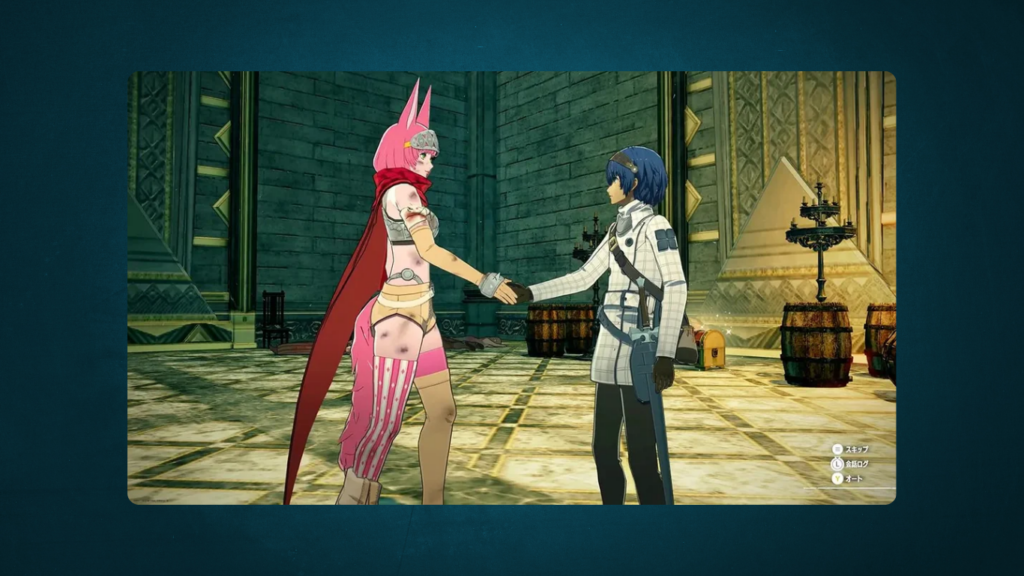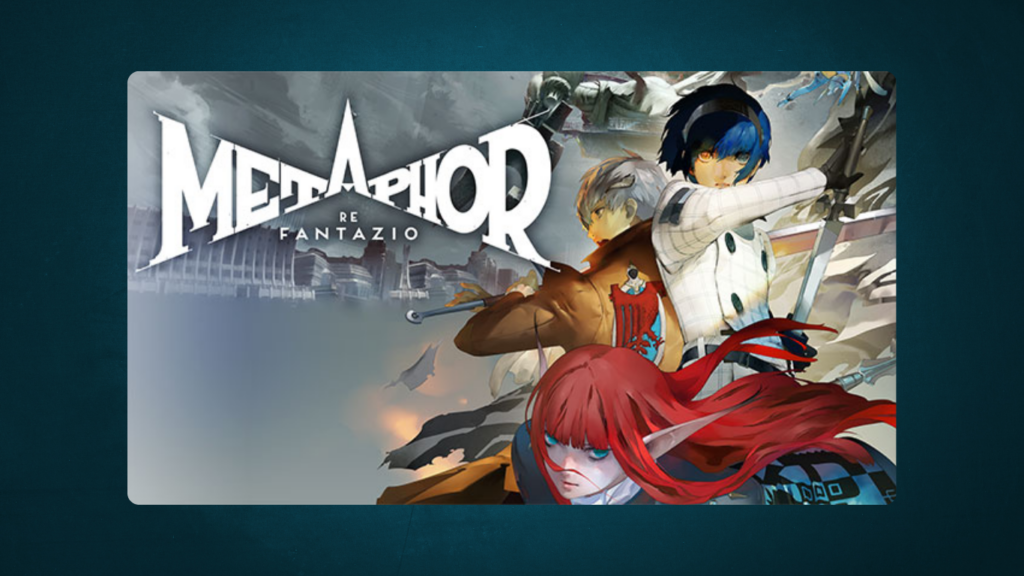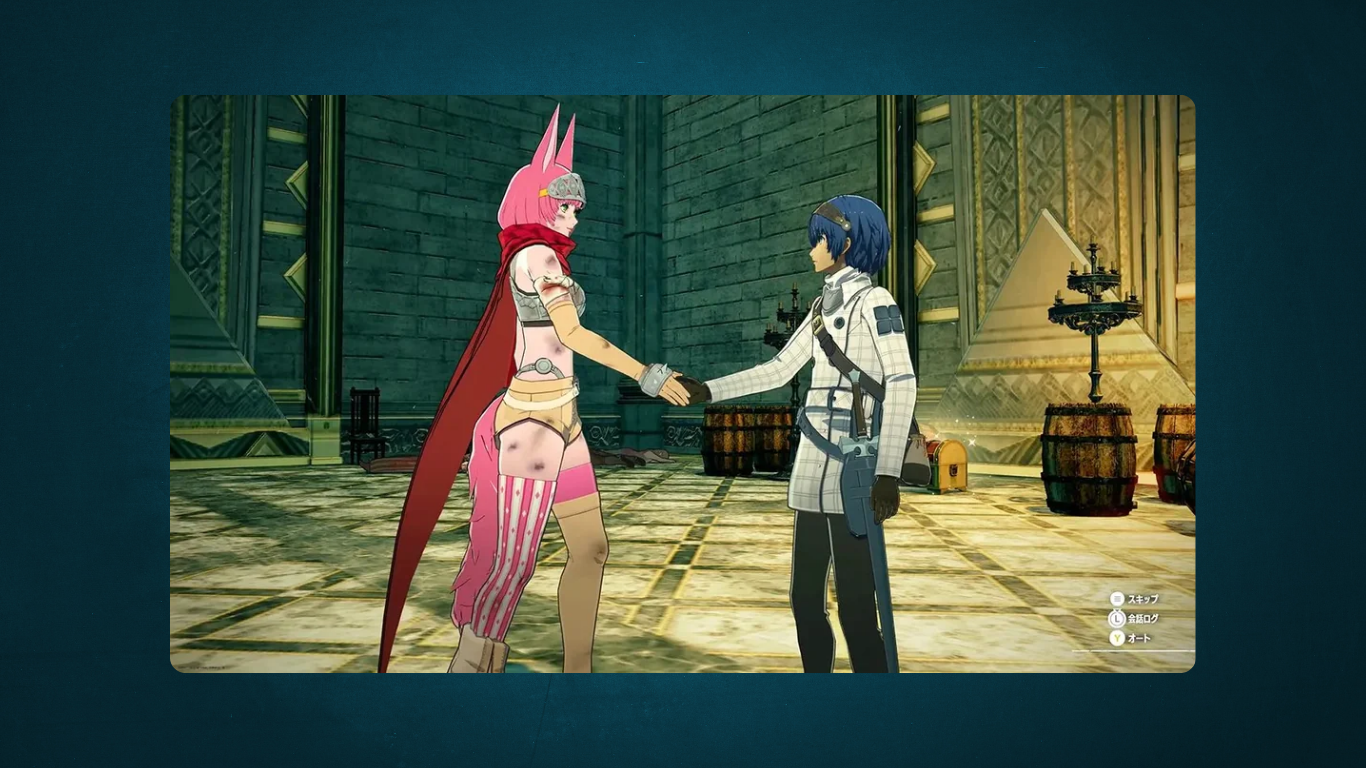Are our favorite stories just an escape from reality, or do they have the power to genuinely impact our lives? After playing nearly every RPG from Atlus, I’m convinced that the answer is a resounding “Yes.” Metaphor: ReFantazio explores this very question in both obvious and nuanced ways through its politically charged fantasy setting. The game proves that the stories we experience, even in a video game, can hold real power. While it may feel familiar at times, Metaphor steps into new territory with clarity and empathy, portraying a challenging world. From intimate character interactions to the sweeping moments of its overarching plot, Metaphor delivers a meaningful message—one that speaks to our world today while examining the best and worst of humanity.
You are thrown into the action without much preamble, taking on the role of a young man in the harsh Kingdom of Euchronia. With the reigning king recently murdered and his only son—the person you have an unexplained connection with—now in a coma, the kingdom finds itself in a state of uncertainty. A magical election kicks off to determine the next ruler, and as a candidate yourself, your journey soon becomes intertwined with the struggles of a divided land. Over the course of an 80-hour adventure, you explore a world plagued by racism, inequality, religious extremism, and exploitation.

These themes are deeply embedded in Metaphor’s narrative, not just as decoration but as essential parts of the story. The game’s writing is unflinching in expressing its stance on these issues. As you build alliances, meet people dealing with these struggles, and travel across the land to gain the support of different communities, the narrative does an incredible job of illustrating the dynamics behind such widespread injustices. For a game called Metaphor, it isn’t interested in being subtle about its message—and that’s ultimately to its benefit, making Atlus’ position unmistakably clear.
Challenging Combat and Evolved Systems
Atlus is known for delivering engaging RPG combat, and Metaphor is no exception. It utilizes the press-turn system familiar to fans of Shin Megami Tensei, where exploiting enemy weaknesses gives your team extra actions. But it also adds new elements that make the combat feel fresh. One key addition is the Archetype system—a class-based job system that offers flexibility by letting any character take on any role while carrying skills across classes they’ve mastered. This opens up all kinds of tactical possibilities for your party, and the freedom to mix and match skills leads to some truly unique builds.
Advanced Archetypes become available later in the game, and these come with mechanics that add depth to battles, especially when combined with Synthesis attacks. Each Archetype has its own set of abilities, and different combinations in your party unlock powerful Synthesis moves that consume multiple turns but deal massive damage or provide important strategic advantages. These abilities often make the difference between victory and defeat, especially against tougher bosses. The interplay between Archetypes, elemental affinities, and Synthesis moves creates a dynamic combat system that feels like solving a complex puzzle—requiring not just power, but also smart tactics and understanding of how to use your resources effectively.
To keep the combat from becoming tedious, Metaphor weaves in real-time action elements. Players can get an early hit on enemies before initiating full turn-based combat, which helps break up the grind of constant battles. You can even hack-and-slash through lower-level enemies without needing to enter a formal fight. The game also provides plenty of items to help level up Archetypes outside of combat, rewarding players for maximizing their skills and diversifying their options. Whether it’s the fighting, social mechanics, or character development, Metaphor takes the best of Atlus’ RPG formula and improves it—making everything more efficient and streamlined.
Building Bonds and Making Decisions
A huge part of what makes Metaphor resonate is how it balances familiar RPG systems with new ideas. The Bond/Follower system and Royal Virtue system are adaptations of Persona’s social links and stats, but refined to be more transparent and effective. Leveling up bonds is less of a guessing game, with clearer conditions and visible progress in virtue stats. These adjustments make interacting with the game’s mechanics smoother and more rewarding, encouraging players to engage deeply with the story.

The bonds you build span different characters from diverse backgrounds, all affected by injustice in some way. As the game pushes you to earn people’s trust and connect with those who have been left behind by society, it ties into the broader theme of unity and solidarity. This isn’t just about gaining power or support for your candidacy; it’s also about genuinely making a difference in the lives of those you meet.
The calendar-based system also gives weight to every decision. Time moves forward day by day, and how you choose to spend each afternoon and evening has real consequences. While the main story progresses towards the election of a new ruler, you need to carefully decide how to balance social interactions, dungeon crawling, and hitting major objectives. There’s a constant sense of urgency, a ticking clock that drives the narrative forward. Unlike the casual exploration of Persona 5‘s Mementos, every day in Metaphor matters—making each choice feel significant.
The game’s main hub is the Gauntlet Runner, a mechanical, steampunk-inspired ship with legs, which transports you across the kingdom. Not only does it serve as a stylish and functional means of travel, but it also acts as a hub for improving your bonds, enhancing virtues, and boosting combat stats during travel time. It creates a sense of a traveling band always on the move, yet still fostering relationships. The game is careful to avoid wasting a moment—every gameplay element feeds into the others in a way that makes the entire experience feel cohesive.
Sidequests and the World Around You
Between major story beats, sidequests provide opportunities to explore more of the kingdom and interact with the world beyond the main plot. Whether it’s hunting bounties or helping out NPCs, these side activities deepen your understanding of Euchronia and offer chances for combat. While dungeon layouts may become predictable, these excursions keep you engaged, thanks to tough enemies that require careful strategy and a variety of rewards like money, powerful gear, experience, and social rank boosts.
Because everything runs on a calendar system, choosing to spend time on these sidequests becomes a more deliberate action. You can’t just casually wander off—you need to consider how it fits into the bigger picture. But this constant movement from one area to another ties in beautifully with the game’s sense of adventure. The Gauntlet Runner, your mobile base, brings all the members of your traveling group together, offering a sense of unity despite the game’s vast scale. Whether it’s building bonds on the journey or leveling up combat stats, Metaphor ensures that all its elements are interconnected and that every moment has purpose.
The Power of Storytelling in Games
Beyond its gameplay, Metaphor: ReFantazio stands out for the way it engages with real-world issues. The story’s exploration of inequality, religious extremism, and systemic oppression is a reminder that games can be more than just entertainment—they can make us think about the world around us. The game’s characters, complex storylines, and immersive world all come together to show that fiction has the power to impact us on a deeper level.
What makes Metaphor especially powerful is the empathy it conveys. The game doesn’t shy away from showing the harsh realities of its world, but it also shows hope. Whether you’re building relationships with marginalized people, fighting against injustice, or making decisions that affect the entire kingdom, Metaphor: ReFantazio makes it clear that change is possible. Even in a world filled with cruelty, there’s always the potential for something better. It’s a message that feels profoundly relevant today, and it’s a testament to the power of well-crafted storytelling.

Subtly charming pop culture geek. Amateur analyst. Freelance tv buff. Coffee lover
